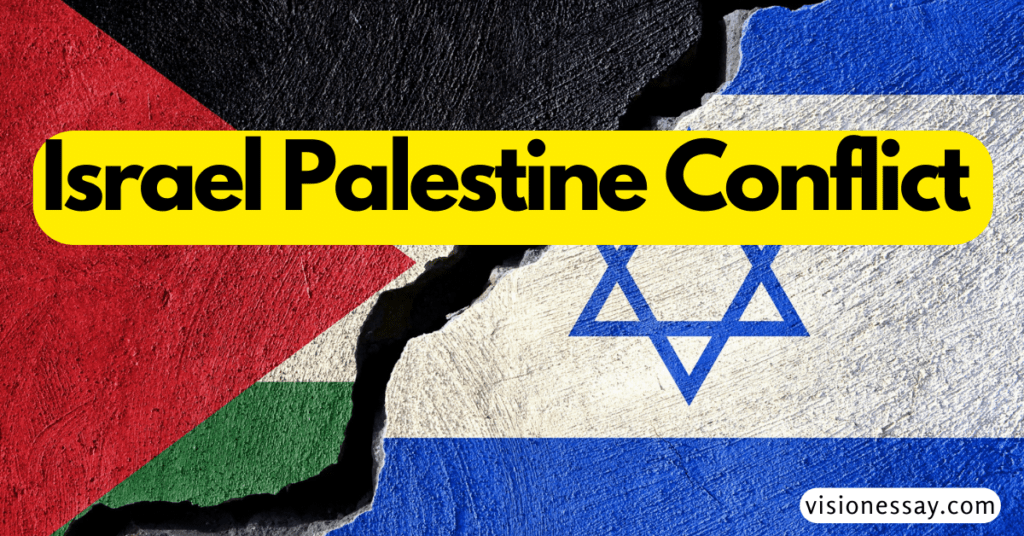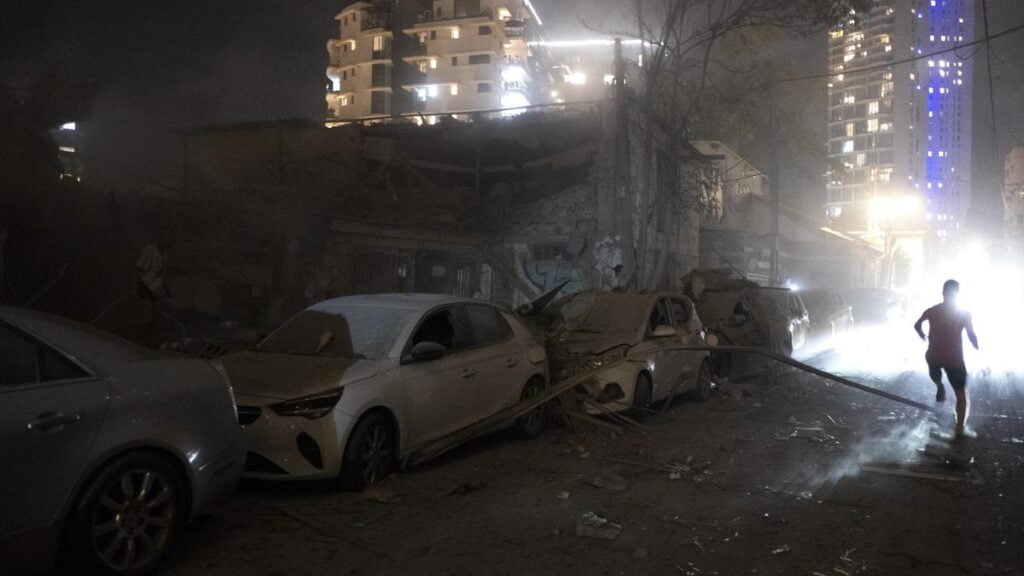
Introduction
The Israel Palestine Conflict is too old but on October 7, 2023, something changed. Hamas launched thousands of missiles into Israel before daybreak, and hundreds of militants burst over multiple spots in the fence separating the Gaza Strip and Israel to attack, kill, and abduct Israelis mostly in the border towns. Recently, Israel came under savage bombardment from the land, the air, and the sea by Hamas, the terrorist organization in control of the Gaza Strip, which resulted in several deaths. This has forced the participation of international and regional forces as the century-old Israel Palestine Conflict has once more flared up.

What is the History of Israel Palestine Conflict?
- Creation Of Palestine
- British forces left Palestine in 1948 after being unable to stop Arab and Jewish bloodshed, handing the task of settling the conflicting claims to the newly established United Nations.
- The majority of Arab countries rejected the UN’s proposal to divide Palestine into separate Arab and Jewish states.
- Arab Israel War (1948)
- The Arab governments that were close by launched an invasion when the Jewish state of Israel declared its independence in 1948. Israel had around 50% more area under its control at the end of the war than the UN’s initial partition plan had anticipated.
- UN Partition Plan
- According to the Plan, Jordan was in charge of the West Bank and the holy sites in Jerusalem while Egypt was in charge of the Gaza Strip. However, the Palestinian Liberation Organization was not able to be founded in 1964 as a result of its failure to resolve the Palestinian conflict.
- Palestinian Liberation Organisation (PLO)
- With the intention of liberating Palestine from Israeli and Jewish rule and establishing Muslim Brotherhood supremacy in the Arab world, the PLO was created.
- In 1975, the UN gave the PLO observer status and formally recognized the right of the Palestinian people to self-determination.
- Six-Day War
- During the 1967 war, Israeli troops captured the Sinai Peninsula and Gaza Strip from Egypt, the West Bank and East Jerusalem from Jordan, and the Golan Heights from Syria.
- Emergence of Hamas
- 1987 saw the founding of Hamas, a terrorist branch of the Muslim Brotherhood in Egypt that sought to further its goals via jihadi violence.
- The U.S. government considers Hamas to be a terrorist group. The Palestinian Authority parliamentary elections were won by Hamas in 2006. In 2007, it drove Fatah out of Gaza, dividing the Palestinian organization geographically.
- 1987: The First Intifada (Palestinian Uprising) began as tensions in the occupied West Bank and Gaza reached a breaking point. It turned into a little conflict between Israeli forces and Palestinian terrorists.
- Oslo Accords
- 1993: The Oslo Accords stipulate that both Israel and the PLO would formally recognize one another and forgo using force. The Oslo Accords also formed the Palestinian Authority, which was granted a certain amount of authority in the West Bank and Gaza Strip.
- 2005: Israel starts a unilateral exodus of Jews from Gaza settlements. Israel, meanwhile, maintained a tight embargo on all border crossings.
- UN raised Palestine’s status to a “non-member observer state” in 2012.
- Territorial Disputes of Israel with Neighboring Countries
- West Bank: Between Jordan and Israel is where the West Bank is located. Ramallah, which serves as Palestine’s de facto administrative capital, is one of its major cities. Israel seized possession of it during the war of 1967 and over time built settlements there.
- Gaza: The Gaza Strip, which is sandwiched between Egypt and Israel. Following its occupation in 1967, Israel gave over the authority of Gaza City and day-to-day management of the majority of the region during the Oslo peace negotiations. Israel unilaterally evacuated Jewish colonies from the area in 2005, although it still controls access from abroad.
- Golan Heights: During the conflict with Syria in 1967, Israel took control of the important plateau known as the Golan Heights. In 1981, Israel essentially annexed the region. The Golan Heights and Jerusalem have just received official recognition by the USA as being a part of Israel.
What are Demands in Israel Palestine Conflict?
- Israel
- In addition to growing its settlements and asserting authority over the occupied regions, Israel aspires to preserve its Jewish identity and security as a state.
- Israel wants the Palestinians to stop using violence and accept its right to exist.
- Jerusalem will remain Israel’s unbroken capital, and Israel wants access to its sacred sites.
- Palestine
- In the areas that Israel has been occupying since 1967, including the West Bank, Gaza Strip, and East Jerusalem, Palestine seeks to create an independent and sovereign state.
- Israel should terminate its embargo and military occupation of Palestine and leave the settlements alone.
- Palestinians also desire access to the city’s sacred sites and Jerusalem as their capital.
How has India’s relationship with Israel changed throughout time?
- India’s Stand on the Israel Palestine Conflict
- As a result of its own experience during the months leading up to independence, India was one of the few nations to reject the UN’s partition proposal in 1947.
- India was the first non-Arab nation to recognize the Palestine Liberation Organization (PLO) as the sole representation of the Palestinians when it recognized Israel in 1950. In 1988, India was among the first nations to recognize Palestine as a separate state.
- India has recently been observed shifting its policy toward dehyphenation.
- Dehyphenation of Policy:
- After being unambiguously pro-Palestine for the first 40 years, India’s position on the world’s longest-running conflict has changed to a delicate balancing act with its three-decade-old good relations with Israel.
- India’s stance has come to be seen as being pro-Israel in recent years.
- Additionally, India supports a two-state solution to the Israel-Palestine issue and offers both nations the peaceful right to self-determination.
What is the Impact of Assault on Israel-Saudi Arabia Ties?
- Disrupting efforts to unite Saudi Arabia and Israel, as well as other nations who could be interested in restoring relations with Israel, can be linked to one of the causes of Hamas’ attack on Israel.
- Threats to the Al-Aqsa Mosque in Jerusalem, the ongoing Israeli siege of Gaza, and Israeli normalization with neighbors were among the issues underlined by Hamas.
- The Muslim Brotherhood’s objective and Israel’s claim to territorial sovereignty over the Arab and Middle East would both benefit from the dehyphenation of Saudi Arabia and Israel.
- Normalization of relations between Israel and regional nations will give Israel more confidence and enhance its position with regard to regaining Palestinian territory.
- To the dismay of Palestinians, links with the UAE, Egypt, Saudi Arabia, and other countries will provide infrastructure development a strong push and foster interdependence and partnerships among these nations.
What could be Solution to Israel Palestine conflict?
- The Two-State Solution
- One of the suggestions that has received the most support is the formation of two states, one Palestinian and one Israeli, with mutually agreed-upon and internationally recognized borders.
- Additionally, the two-state solution seeks to resolve the conflict’s key concerns, including Jerusalem, refugees, settlements, security, and water.
- Numerous foreign leaders, including those from China, India, and the United States, have also endorsed it.
- The One-State Solution
- This strategy proposes a single, binational state with equal representation for Israelis and Palestinians.
- Addressing the issues of both populations while ensuring that no group feels neglected is difficult with this strategy.
- The Confederation Model
- A confederation of two independent nations with common institutions and cooperation in areas like security, the economy, and resources is an idea put up by some. This concept maintains collaboration while allowing for some degree of autonomy.
- International Trusteeship
- In this scenario, the territory would be supervised and governed by an international organization or coalition until a more durable and amicable resolution can be found. The international community would have to work with us to implement this strategy.
Also Read: A Dark Truth Of Israel-Hamas War, 2023
Way Forward for Israel Palestine Conflict
- The international community must unite for a peaceful resolution, but the Israeli government’s and other parties’ resistance has made the situation worse. Therefore, maintaining good ties with both Israel and Arab nations would benefit from a balanced strategy.
- The Abraham Accords, and recent rapprochement agreements between Israel and the UAE, Bahrain, Sudan, and Morocco, are positive developments. All regional powers should consider a peace agreement along the lines of the Abraham Accords between the two nations.
- “Strenuous efforts in cooperation with all related parties to achieve security and stability in the Middle East and West Asia” are necessary for India’s position in international organizations.
- India was re-elected to the Human Rights Council for the years 2022–2024 and is now serving as a non-permanent member of the United Nations Security Council for the years 2021–2022. India ought to utilize these international venues to serve as a mediator in order to settle the Israel-Palestine conflict.
Conclusion
Israel Palestine conflict remains deeply entrenched, with recent escalations underscoring its enduring complexity. India’s evolving stance, transitioning from a pro-Palestine position to a delicate balancing act with Israel, reflects changing geopolitical dynamics. International efforts must unite for a peaceful resolution, while recent agreements like the Abraham Accords offer hope. India’s role as a mediator in international organizations can play a crucial part in facilitating a lasting solution to this century-old conflict and promoting regional security and stability.
Frequently Asked Questions(FAQs)
Why is Israel and Palestine at war 2023?
The continuing Israel Palestine Conflict 2023, which began after the Hamas Group launched about 3000 rockets at Israel’s main cities in less than 20 minutes, has alarmed the whole world.
What has Israel done to Palestine?
In 2008, 2012, 2014, and 2021, Israel launched four long military invasions on Gaza. Tens of thousands of Palestinian houses, schools, and office buildings have been demolished, along with thousands of Palestinians who were slain, many of them children.
Why does Hamas want Israel?
Officials from Hamas noted long-standing tensions, including a disagreement over the delicate Al-Aqsa Mosque, which is important and sacred to both Muslims and Jews. Violence has already broken out between rival claims to the location, known to Jews as the Temple Mount, including a brutal 11-day conflict in 2021 between Israel and Hamas.
Who started the Israel Palestine Conflict 2023?
The start of “Operation Al-Aqsa Flood” was declared by Hamas at around 06:00 Israel Summer Time (UTC+3) on October 7, 2023, claiming that it had launched more than 5,000 missiles into Israel from the Gaza Strip in less than 20 minutes.
Sources:
- 2023 Israel–Hamas war – Wikipedia
- https://www.thehindu.com/news/international/israel-hamas-war-1500-bodies-of-hamas-militants-found-around-gaza-strip-says-israel-army/article67403115.ece
- https://indianexpress.com/article/world/israel-hamas-war-what-has-happened-what-caused-the-conflict-your-faqs-answered-8981355/
- https://www.drishtiias.com/daily-updates/daily-news-analysis/israel-palestine-conflict-1#:~:text=1987%3A%20Founding%20of%20Hamas%2C%20a,its%20agenda%20through%20violent%20jihad.&text=1987%3A%20Tensions%20in%20the%20occupied,First%20Intifada%20(Palestinian%20Uprising).
